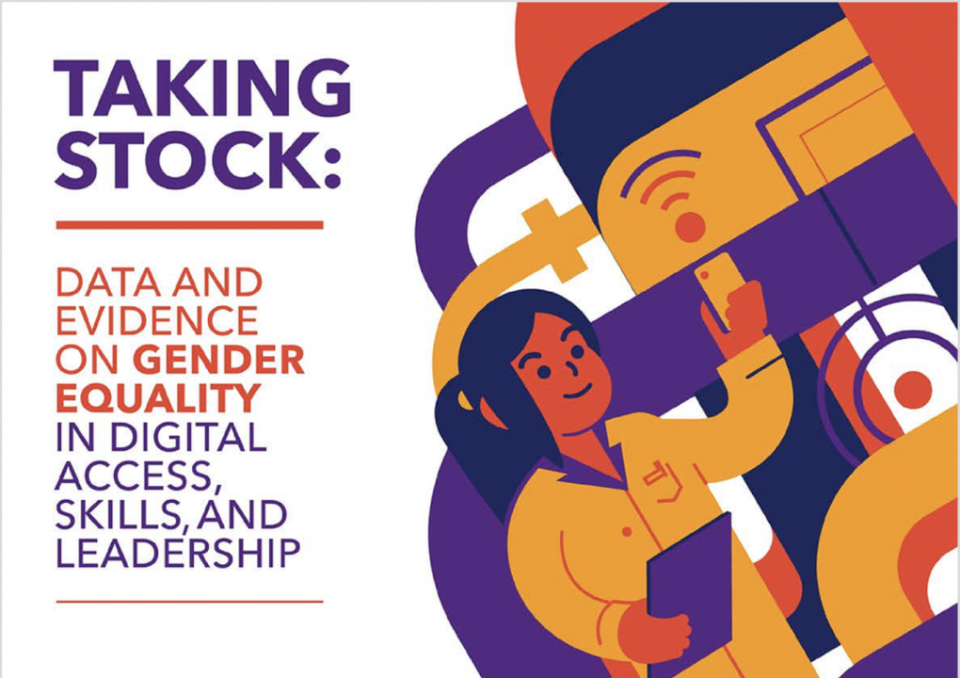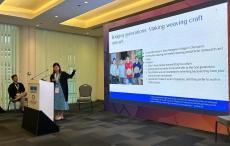
Women and girls are still lagging far behind their male peers in the digital realm, according to a new report launched today under the EQUALS Partnership. The report, Taking Stock: Data and Evidence on Gender Equality in Digital Access, Skills, and Leadership, highlights the implications of persistent gaps across different facets of digital technologies. It also presents a compilation of case studies written by more than 25 leading experts and researchers that tell the story of how technology impacts women and girls in various contexts, including jobs and wages, security and privacy, cyber threats, and new technologies such as artificial intelligence (AI).
The research finds that while developments in digital technologies open new pathways to gender diversity and inclusion, a lack of attention to gender dynamics and differences hampers the potential for true progress. Overcoming offline and online barriers for women and girls to meaningfully access and participate in the digital economy, including breaking the glass ceiling within the ICT industry, remain significant concerns. Conscious and concerted effort by all stakeholders to cut these institutional barriers are needed if we want to see greater participation of women and girls in an increasingly ICT-driven and knowledge-based society. Already, we are seeing problems in the nascent AI industry where systems and processes, designed largely by men, tend to ignore the negative gender implications of their designs.
The analysis of basic and meaningful access to technology presented in this report reveals that irrespective of a country’s overall ICT access levels, economic performance, income level, or geographic location, a gender digital divide persists. The report argues that the gender digital divide widens as technologies become more sophisticated and expensive. While Science, Technology, Engineering, and Mathematics (STEM) education can provide the foundation for advanced digital skills and a career in the tech industry, girls in secondary education tend to have lower self-efficacy and interest in studying STEM subjects as well as lower aspirations for STEM careers. In spite of gains that have been made, women’s leadership and representation in the technology sector remain low across different dimensions of ICT employment, entrepreneurship, and policymaking.
The report also notes that increasing access and participation by women could be associated with increased exposure to undesirable experiences unless that inclusion is accompanied by corresponding changes in the social and institutional cultures that enable or tolerate negative behavior. In this regard, promoting digital gender equality does not stop at providing women with the tools, means, capabilities, and opportunities to access and meaningfully use ICTs, acquire digital skills, and participate in the digital economy. A multi-pronged and holistic approach involving all stakeholders as mapped in the report can give us concrete strategies to address this problem.

The future health of our global economy depends on the empowerment of women and girls. This report highlights the depth and breadth of the existing gender gap in ICT access, skills, and leadership. Widely welcomed by the UN, interested NGOs, and private sector actors in the field, its findings set the foundation needed to build strong, evidence-based strategies to close the gap. Doing so will help improve universal gender equality and the health of the global economy, both priority agenda items for the United Nations in 2019.
Dr. David M. Malone (Rector of the United Nations University and Under-Secretary-General of the United Nations)
The work of EQUALS corresponds to the key concept in the UN 2030 Agenda for Sustainable Development, which is “leave no one behind” – a commitment particularly relevant to women and girls in the era of rapid technological transformations. The report emphasizes the need for more official, comparable, and credible gender-disaggregated data, as well as better measurement tools, to accurately capture women’s level of ICT access, skills, and leadership participation. Research, government policy, and design principles should include gender awareness and analysis, for example by being conscious of issues that may have invisible gender-based dimensions (such as owning a phone and having control over the use of the phone) and avoiding gender stereotypes.
EQUALS is a global partnership of corporate leaders, governments, non-profit organizations, communities, and individuals around the world working together to bridge gender digital inequalities. EQUALS was founded in 2016 by five partners: the International Telecommunications Union, UN Women, the International Trade Centre, GSMA, and the United Nations University. The Partnership works to reverse the increasing gender digital divide, and to close the gap by 2030 – supporting UN Sustainable Development Goal 5 by empowering women through their use of information and communication technologies.
Supporting the work of the three EQUALS Coalitions (Access, Skill, and Leadership), the Research Group – led by the United Nations University Institute in Macau – is composed of experts that focus on generating knowledge about the existence, causes, and remedies for gender tech inequalities, and on motivating key stakeholder groups, including private sector companies, government departments, regulatory agencies, and academia, to collect and share gender-relevant data.
Follow @EQUALS and @UNU_CS on Twitter and join the conversation by using the hashtag #EQUALSinTech.



